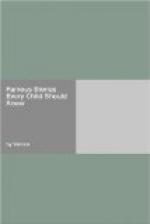“Sorry to incommode you,” said their visitor, ironically. “I’m afraid your beds are dampish; perhaps you had better go to your brother’s room: I’ve left the ceiling on, there.”
They required no second admonition, but rushed into Gluck’s room, wet through, and in an agony of terror.
“You’ll find my card on the kitchen table,” the old gentleman called after them. “Remember the last visit.”
“Pray Heaven it may!” said Schwartz, shuddering. And the foam globe disappeared.
Dawn came at last and the two brothers looked out of Gluck’s little window in the morning. The Treasure Valley was one mass of ruin and desolation. The inundation had swept away trees, crops, and cattle, and left in their stead a waste of red sand and gray mud. The two brothers crept shivering and horror-struck into the kitchen. The water had gutted the whole first floor; corn, money, almost every movable thing, had been swept away and there was left only a small white card on the kitchen table. On it, in large, breezy, long-legged letters, were engraved the words: South-West Wind, Esquire.
II.—OF THE PROCEEDINGS OF THE THREE BROTHERS AFTER THE VISIT OF SOUTHWEST WIND, ESQUIRE; AND HOW LITTLE GLUCK HAD AN INTERVIEW WITH THE KING OF THE GOLDEN RIVER.
Southwest Wind, Esquire, was as good as his word. After the momentous visit above related, he entered the Treasure Valley no more; and, what was worse, he had so much influence with his relations, the West Winds in general, and used it so effectually, that they all adopted a similar line of conduct. So no rain fell in the valley from one year’s end to another. Though everything remained green and flourishing in the plains below, the inheritance of the Three Brothers was a desert. What had once been the richest soil in the kingdom, became a shifting heap of red sand; and the brothers, unable longer to contend with the adverse skies, abandoned their valueless patrimony in despair, to seek some means of gaining a livelihood among the cities and people of the plains. All their money was gone, and they had nothing left but some curious, old-fashioned pieces of gold plate, the last remnants of their ill-gotten wealth.
“Suppose we turn goldsmiths?” said Schwartz to Hans, as they entered the large city. “It is a good knave’s trade; we can put a great deal of copper into the gold, without any one’s finding it out.”
The thought was agreed to be a very good one; they hired a furnace, and turned goldsmiths. But two slight circumstances affected their trade: the first, that people did not approve of the coppered gold; the second, that the two elder brothers, whenever they had sold anything, used to leave little Gluck to mind the furnace, and go and drink out the money in the ale-house next door. So they melted all their gold, without making money enough to buy more, and were at last reduced to one large drinking-mug, which an uncle of his had given to little Gluck, and




